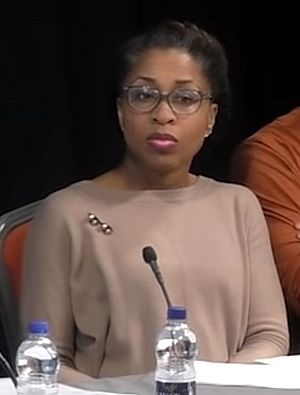Nicola Rollock facts for kids
Quick facts for kids
Nicola Rollock
|
|
|---|---|

Rollock in 2019
|
|
| Born |
South West London, England
|
| Alma mater | University of Liverpool Birkbeck, University of London UCL Institute of Education |
| Scientific career | |
| Institutions | London Metropolitan University UCL Institute of Education Goldsmiths, University of London University of Birmingham University of Cambridge King's College London |
| Thesis | Legitimate players? : an ethnographic study of academically successful Black pupils in a London secondary school (2006) |
Nicola Rollock is a British professor, writer, and activist. She is a professor at King's College London, where she studies how society and race affect people's lives. Before this, she worked at Goldsmiths College, University of London, focusing on fairness and education.
She has written books, like The Colour of Class (2014), which looks at how Black middle-class families help their children succeed in school. She is recognized as one of the most influential Black Britons on the Powerlist. She also won a PRECIOUS award for her work to make things fairer for everyone, especially when it comes to race.
Contents
Early Life and Education
Nicola Rollock was born in South West London, England. Her parents came from Barbados. Her father always told her to focus on school. She loved reading when she was young and later studied English literature.
She studied psychology at the University of Liverpool and earned her first degree in 1994. She continued her studies, getting a special certificate in family and couple therapy from Birkbeck, University of London. In 2001, she became the head of education at the Runnymede Trust, an organization that works for racial equality. For her advanced studies, she went to the UCL Institute of Education. There, she researched how well Black students performed in British secondary schools.
Research and Career
After finishing her advanced degree in 2006, Rollock worked at London Metropolitan University for three years. Then, she returned to the UCL Institute of Education as a research associate. Her research showed that Black children still faced a gap in their school achievements. This was true even if they came from families with the same wealth as their white classmates. She has shared her research with the British parliament to help improve the education of Black students.
Working with the Runnymede Trust, Rollock published a report called The Stephen Lawrence Inquiry 10 Years On. This report looked at how British policing needed to change to support the many different people living in Britain. The report suggested ways to better record racist incidents and improve how police monitor crimes motivated by race. It also recommended increasing public checks on police work and helping Black staff advance in their careers. This report was given to the Home Office and Ministry of Justice in 2009.
Supporting Black Women in Academia
In 2019, Rollock wrote a report called Staying Power. This report showed that in February 2019, there were fewer than thirty Black British women professors in the United Kingdom. This number was very low, especially since there were 18,000 professors in total, with most of them being white men. Important magazines like The Guardian, Vogue, and Stylist wrote about this issue.
Rollock found that Black women were not well-represented because of unfair treatment, bullying, and harmful stereotypes based on race. She is dedicated to making Black women professors more visible. She also wants to encourage and support more women to become professors. The Black Female Professors Forum was started by Iyiola Solanke in 2019 to help with this goal.
Working for Equality in Education
In 2019, Rollock joined the Home Affairs Select Committee inquiry called Macpherson Report: Twenty Years On. This inquiry looked at the progress made since the Murder of Stephen Lawrence twenty years earlier. She was also chosen to lead efforts at Goldsmiths, University of London to close the achievement gap for black and minority ethnic (BAME) students.
In this role, she leads a group that includes staff and students. They work together to understand why there is an achievement gap and to find solutions. These efforts are part of a larger plan by the Government of the United Kingdom to end unfairness between different ethnic groups in higher education.
Rollock is part of the Wellcome Trust Diversity & Inclusion Steering Group. She also serves on the British Science Association Equality, Diversity and Inclusion Advisory Group. She is a member of the BBC Academy. Rollock often shares her thoughts on racial inequality with the media. She has said that universities sometimes deal with race in ways that are not very deep or meaningful.
Phenomenal Women Exhibition
Based on her research, Rollock helped create a traveling art show called Phenomenal Women: portraits of UK Black female professors. The goal of this exhibition was to change ideas about what a professor looks like. It also aimed to show how race and gender connect and to highlight the achievements of this group of academics who are not often seen. The exhibition featured photographs by Bill Knight. Phenomenal Women was shown at places like London's Southbank Centre in 2020 and at the University of Cambridge in 2021.
Rollock is a Distinguished Fellow of the Faculty of Education at the University of Cambridge. In September 2021, she became a Professor of Social Policy and Race at King's College London.
Rollock is the first editor of the Routledge journal Whiteness and Education. She has also written articles for The Conversation and the Financial Times.
Awards and Honours
Rollock has received several awards and honours, including:
- 2015: Woman of Achievement by the Women of the Year Council
- 2016: PRECIOUS Award
- 2019: Powerlist of Britain's most influential people of African and African Caribbean heritage
 | Aaron Henry |
 | T. R. M. Howard |
 | Jesse Jackson |

